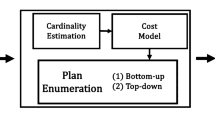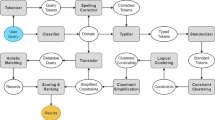Abstract
A common task of Web users is querying structured information from Web pages. For realizing this interesting scenario we propose a novel query processor for systematically discovering instances of semantic relations in Web search results and joining these relation instances into complex result tuples with conjunctive queries. Our query processor transforms a structured user query into keyword queries that are submitted to a search engine, forwards search results to a relation extractor, and then combines relations into complex result tuples. The processor automatically learns discriminative and effective keywords for different types of semantic relations. Thereby, our query processor leverages the index of a search engine to query potentially billions of pages. Unfortunately, relation extractors may fail to return a relation for a result tuple. Moreover, user defined data sources may not return at least k complete result tuples. Therefore we propose an adaptive routing model based on information theory for retrieving missing attributes of incomplete result tuples. The model determines the most promising next incomplete tuple and attribute type for returning any-k complete result tuples at any point during the query execution process. We report a thorough experimental evaluation over multiple relation extractors. Our query processor returns complete result tuples while processing only very few Web pages.








Similar content being viewed by others
References
Agichtein, E., & Gravano, L. (2003). Qxtract: a building block for efficient information extraction from plain-text databases. In SIGMOD conference (p. 663).
Avnur, R., & Hellerstein, J.M. (2000). Eddies: continuously adaptive query processing. In SIGMOD conference (pp. 261–272).
Banko, M., & Etzioni, O. (2008). The tradeoffs between open and traditional relation extraction. In ACL (pp. 28–36).
Boden, C., Hafele, T., Löser A. (2011). Classification algorithms for relation prediction. In ICDE workshops (pp. 46–52).
Boden, C., Löser, A., Nagel, C., Pieper, S. (2011). Factcrawl: a fact retrieval framework for full-text indices. In 14th WebDB workshop with ACM SIGMOD
Boden, C., Löser, A., Nagel, C., Pieper, S. (2012). Fact-aware document retrieval for information extraction. Datenbank-Spektrum, 12, 89–100.
Castellanos, M., Wang, S., Dayal, U., Gupta, C. (2010). Sie-obi: a streaming information extraction platform for operational business intelligence. In SIGMOD conference (pp. 1105–1110).
Chakrabarti, S., Sarawagi, S., Sudarshan, S. (2010). Enhancing search with structure. IEEE Data Engineering Bulletin, 33(1), 3–24.
Clarke, C.L.A., Kolla, M., Cormack, G.V., Vechtomova, O., Ashkan, A., Büttcher, S., MacKinnon, I. (2008). Novelty and diversity in information retrieval evaluation. In SIGIR (pp. 659–666).
Croft, B., Metzler, D., Strohman, T. (2009). Search engines: Information retrieval in practice (1st ed.) USA: Addison-Wesley Publishing Company.
Crow, D. (2010). Google Squared: Web scale, open domain information extraction and presentation. In ECIR, industrial track.
DeRose, P., Shen, W., 0002, F.C., Doan, A., Ramakrishnan, R. (2007a). Building structured web community portals: A top-down, compositional, and incremental approach. In VLDB (pp. 399–410).
DeRose, P., Shen, W., 0002, F.C., Lee, Y., Burdick, D., Doan, A., Ramakrishnan, R. (2007b). Dblife: A community information management platform for the database research community (demo). In CIDR (pp. 169–172).
Dong, X., Halevy, A., Madhavan, J. (2005). Reference reconciliation in complex information spaces. In ACM SIGMOD (pp. 85–96).
Etzioni, O., Banko, M., Soderland, S., Weld, D.S. (2008). Open information extraction from the web. Communications of the ACM, 51(12), 68–74.
Feldman, R., Regev, Y., Gorodetsky, M. (2008). A modular information extraction system. Intelligent Data Analysis, 12(1), 51–71.
Fortune 500 companies (2010). http://money.cnn.com/magazines/fortune (Last visited 01/06/10).
Fung, G.P.C., Yu, J.X., Lu, H. (2002). Discriminative category matching: Efficient text classification for huge document collections. In ICDM (pp. 187–194).
Galhardas, H., Florescu, D., Shasha, D., Simon, E., Saita, C.A. (2001). Declarative data cleaning: language, model, and algorithms. In VLDB (pp. 371–380).
Grishman, R., Huttunen, S., Yangarber, R. (2002). Information extraction for enhanced access to disease outbreak reports. Journal of Biomedical Informatics, 35(4), 236–246.
Halevy, A.Y. (2001). Answering queries using views: a survey. The VLDB Journal, 10, 270–294.
HSQLDB (2011). http://hsqldb.org/ (Last visited 06/14/11).
Ilyas, I.F., Beskales, G., Soliman, M.A. (2008). A survey of top-query processing techniques in relational database systems. ACM Computing Surveys, 40(4).
Ipeirotis, P.G., Agichtein, E., Jain, P., Gravano, L. (2006). To search or to crawl?: towards a query optimizer for text-centric tasks. In SIGMOD conference (pp. 265–276).
Jain, A., Doan, A., Gravano, L. (2008). Optimizing sql queries over text databases. In ICDE (pp. 636–645).
Jain, A., Ipeirotis, P.G., Doan, A., Gravano, L. (2009). Join optimization of information extraction output: quality matters! In ICDE (pp. 186–197).
Jain, A., & Pantel, P. (2010). Factrank: random walks on a web of facts. In COLING (pp. 501–509).
Jain, A., & Srivastava, D. (2009). Exploring a few good tuples from text databases. In ICDE (pp. 616–627).
Kasneci, G., Suchanek, F.M., Ramanath, M., Weikum, G. (2008). The YAGO-NAGA approach to knowledge discovery. SIGMOD Record, 37, 4.
Liu, J., Dong, X., Halevy, A.Y. (2006). Answering structured queries on unstructured data. In WebDB.
Löser, A., Hüske, F., Markl, V. (2008). Situational business intelligence. In BIRTE.
Löser, A., Lutter, S., Düssel, P., Markl, V. (2009). Ad-hoc queries over document collections—a case study. In BIRTE (pp. 50–65).
Löser A., Nagel, C., Pieper, S. (2010). Augmenting tables by self-supervised web search. In BIRTE
Markl, V., Raman, V., Simmen, D.E., Lohman, G.M., Pirahesh, H. (2004). Robust query processing through progressive optimization. In SIGMOD conference (pp. 659–670).
Naumann, F. (2002). Quality-driven query answering for integrated information systems. Lecture notes in computer science Vol. 2261: Springer.
OpenCalais (2011). www.opencalais.com (Last visited 06/14/11).
Pérez-Martínez, J.M., Llavori, R.B., Cabo, M.J.A., Pedersen, T.B. (2008). Contextualizing data warehouses with documents. Decision Support Systems, 45(1), 77–94.
Riloff, E. (1996). Automatically generating extraction patterns from untagged text. AAAI/IAAI, 2, 1044–1049.
Selinger, P.G., Astrahan, M.M., Chamberlin, D.D., Lorie, R.A., Price, T.G. (1988). Access path selection in a relational database management system. In Proceedings of the 1979 ACM SIGMOD international conference on management of data, 30 May–1 June 1979 (pp. 23–34). Boston, Massachusetts.
Wu, F., & Weld, D.S. (2010). Open information extraction using wikipedia. In ACL (pp. 118–127).
Yu, C., Lakshmanan, L.V.S., Amer-Yahia, S. (2009). It takes variety to make a world: diversification in recommender systems. In EDBT (pp. 368–378).
Acknowledgments
The research leading to these results has received funding from the European Union’s Seventh Framework Programme (FP7/2007-2013) under grant agreement nr. FP7-ICT-2009-5-257859, ‘Risk and Opportunity management of huge-scale BUSiness community cooperation’ (ROBUST). Alexander Löser also received funding from the Federal Ministry of Economics and Technology (BMWi) under grant agreement “01MD11014A, ‘MIA-Marktplatz für Informationen und Analysen’ (MIA)”.
Author information
Authors and Affiliations
Corresponding author
Rights and permissions
About this article
Cite this article
Löser, A., Nagel, C., Pieper, S. et al. Beyond search: Retrieving complete tuples from a text-database. Inf Syst Front 15, 311–329 (2013). https://doi.org/10.1007/s10796-012-9403-8
Published:
Issue Date:
DOI: https://doi.org/10.1007/s10796-012-9403-8




